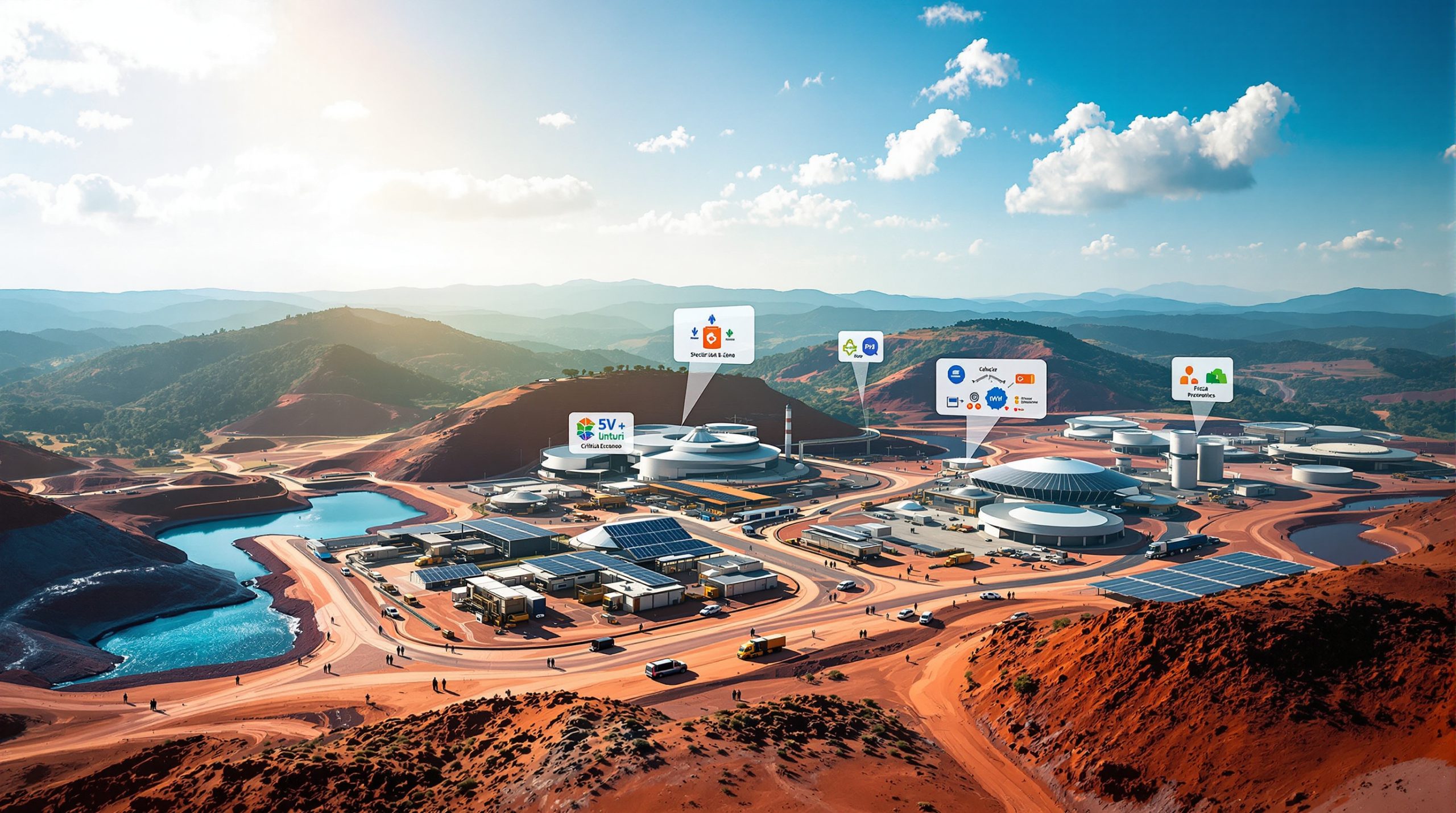Rebuilding America's Critical Mineral Supply: Perpetua Resources' Antimony Strategy
Perpetua Resources is positioning itself as a cornerstone in rebuilding America's domestic antimony supply chain through strategic processing partnerships. The Idaho-based company recently received government approval to begin construction of its antimony and gold mine and is now focusing on establishing crucial processing relationships to complete the supply chain.
The Strategic Importance of Domestic Antimony
Antimony has gained recognition as a critical mineral for both national security and clean energy applications. Currently, there is no active domestic antimony production in the United States, creating a significant supply vulnerability. This situation has been exacerbated by China's decision to restrict exports, putting Western nations in a precarious position.
This essential mineral serves multiple crucial functions across various sectors. It's commonly used in military applications, flame retardants, solar panels, and emerging battery technologies. The lack of domestic production represents a strategic weakness in America's critical minerals strategy.
Stibnite Gold Project: America's Antimony Cornerstone
Located 222 kilometers north of Boise, Idaho, the Stibnite Gold Project represents a significant opportunity for domestic antimony production. The site contains estimated reserves of 148 million pounds of antimony alongside approximately 6 million ounces of gold reserves.
According to company projections, the mine is positioned to supply up to 35% of US antimony demand in its first six years of operation. This would mark a transformative shift away from complete foreign dependence for this strategic mineral.
Jon Cherry, Perpetua's CEO, emphasized the company's strategic vision: "We are encouraged by emerging opportunities to expand domestic mineral processing capacity in America and intend to make well-informed, market-based decisions when selecting a partner." This approach underscores Perpetua's commitment to rebuilding domestic supply chains through strategic collaborations.
Who Are Perpetua's Potential Processing Partners?
Perpetua Resources has initiated discussions with several major global commodity traders and industrial partners to establish antimony processing capabilities within the United States. The company plans to extract the metal but not refine it, making these partnerships crucial to completing the domestic supply chain.
Global Commodity Trading Giants
Among the potential partners are global mining and commodity trading companies with extensive metal processing experience. Glencore, one of the world's largest diversified natural resource companies, brings significant expertise in metals processing and global distribution networks to the table.
Trafigura, another potential partner, represents one of the world's largest independent commodity traders with established metals processing expertise. Both companies could provide Perpetua with the technical knowledge and market connections needed for successful antimony processing operations.
Industrial and Mining Partners
On the industrial side, Clarios has emerged as another potential partner. As a global leader in advanced energy storage solutions, Clarios could provide both processing expertise and potential end-use applications for the refined antimony.
Sunshine Silver, a mining company with potential processing synergies, is also under consideration. Additionally, Perpetua is evaluating several undisclosed potential partners as part of its comprehensive selection process.
Partnership Selection Timeline
Perpetua has announced plans to launch a formal Request for Proposals (RFP) process in the coming weeks. The company expects to select its processing partner by the end of 2025, allowing for integration of the partnership into overall project development plans.
The evaluation criteria for these partnerships will include processing capacity, environmental performance, technical expertise, and operational reliability. This methodical approach reflects the strategic importance of selecting the right partner to ensure long-term supply chain resilience.
How Will These Partnerships Transform the US Antimony Supply Chain?
The establishment of domestic antimony processing capabilities represents a significant shift in America's critical minerals energy transition, moving away from dependence on foreign sources toward greater supply chain security and resilience.
Creating a Complete Domestic Supply Chain
The partnerships aim to create an integrated domestic antimony supply chain with three key components:
- Mining operations at Stibnite to extract antimony ore
- Processing partnerships to refine antimony into usable forms
- End-use applications in defense, energy, and industrial sectors
This comprehensive approach would mark the first complete antimony supply chain in the United States in decades, significantly reducing foreign dependence for this strategic mineral.
Strategic Alignment with National Security Priorities
The development of domestic antimony processing aligns with broader national security objectives by:
- Reducing dependence on Chinese antimony imports
- Supporting Department of Defense critical mineral objectives
- Enhancing supply chain resilience for military applications
With antimony being used in ammunition, night vision devices, and other defense applications, establishing secure domestic sources represents a strategic priority for national security.
Environmental and Social Considerations
Beyond security concerns, these partnerships aim to address environmental and social considerations through:
- Implementation of modern processing technologies to minimize environmental impact
- Development of circular economy approaches to antimony recycling
- Remediation of historical mining impacts through site restoration
This balanced approach seeks to address both security concerns and sustainability objectives, creating a more resilient and responsible supply chain.
What Challenges Does Perpetua Face in Establishing Processing Partnerships?
Despite the strategic importance of domestic antimony production, Perpetua Resources faces several significant challenges in establishing viable processing partnerships that must be addressed for long-term success.
Technical Processing Challenges
Antimony processing presents unique technical challenges that must be overcome:
- Limited existing antimony processing expertise in North America
- Need for specialized equipment and technical knowledge
- Metallurgical testing requirements for Stibnite ore characteristics
These technical hurdles require specialized knowledge and experience, highlighting the importance of selecting partners with appropriate technical capabilities.
Regulatory and Environmental Considerations
The regulatory landscape presents additional challenges:
- Permitting requirements for processing facilities under current regulations
- Environmental performance standards for antimony refining
- Community acceptance of processing operations
The project has already faced legal opposition from Idaho's Nez Perce tribe, which has expressed concerns about potential impacts on the state's salmon population. Addressing these environmental and community concerns will be crucial for project success.
Market Competition Factors
Economic viability in the face of international competition remains a significant challenge:
- Price competition from existing international suppliers
- Need to establish long-term offtake agreements
- Demonstrating economic viability against foreign producers
These market factors will require careful strategic planning and potentially supportive policy frameworks to ensure the competitiveness of domestic production.
How Does This Compare to Other US Antimony Initiatives?
Perpetua's antimony strategy represents one component of broader efforts to rebuild America's antimony capabilities, with several other initiatives also contributing to this strategic objective.
United States Antimony Corporation (USAC)
USAC represents another significant player in the domestic antimony landscape:
- Controls two North American antimony refineries
- Recently secured a $245 million contract from the Defense Logistics Agency
- Potential for complementary role in the supply chain
This parallel development indicates growing recognition of antimony's strategic importance and increasing government support for domestic production.
Comparison of Processing Approaches
| Aspect | Perpetua Resources | USAC |
|---|---|---|
| Primary Focus | Mining with processing partnerships | Refining and processing |
| Production Scale | Potentially largest US antimony source | Smaller-scale existing operations |
| Supply Chain Position | Upstream (mining) with midstream partnerships | Midstream (processing) |
| Defense Contracts | Pursuing through partnerships | Direct $245M DLA contract |
| Current Status | Pre-production, partnerships in development | Operational refineries |
This comparative analysis demonstrates the complementary nature of these initiatives, with potential for collaboration rather than direct competition in rebuilding domestic capabilities.
What Are the Investment Implications of Perpetua's Antimony Processing Partnership?
The company's antimony processing partnerships could significantly impact its investment profile and market position, creating both opportunities and challenges for investors.
Financial Considerations
The partnership approach offers several financial benefits:
- Potential reduction in capital expenditure requirements through shared investment
- Possibilities for revenue-sharing or profit-sharing arrangements
- Stability from long-term offtake agreements
This capital-efficient approach may improve the overall project economics while reducing direct financial exposure for Perpetua.
Market Positioning Benefits
Perpetua's strategy offers several market advantages:
- First-mover advantage in domestic antimony supply
- Premium pricing potential for secure domestic supply
- Diversification beyond gold production
The dual-commodity nature of the project, with both gold and antimony production, provides natural hedging against market volatility in either mineral.
Investor Interest Factors
Several factors make this an attractive investment proposition:
- Billionaire John Paulson remains the company's largest shareholder
- Critical minerals focus is attracting strategic investors
- Potential for government funding support through executive order on minerals
This strategic positioning at the intersection of critical minerals and national security creates a unique investment profile that extends beyond traditional mining economics.
When Will Perpetua's Antimony Supply Chain Be Operational?
The timeline for establishing a complete domestic antimony supply chain depends on several factors, with a phased approach to development.
Project Development Timeline
The current development timeline includes several key milestones:
- Mine construction approval received September 2025
- Processing partnership selection expected by end of 2025
- Construction and commissioning period: 2-3 years
- Potential first production: 2027-2028
This timeline represents a significant acceleration compared to typical mining project development, reflecting the strategic priority placed on domestic antimony production.
Phased Implementation Approach
The company plans a methodical approach to implementation:
- Initial metallurgical testing with selected partners
- Pilot-scale processing demonstrations
- Gradual scaling to full commercial production
This phased approach allows for optimization of processing techniques and market development while managing technical and financial risks.
What Environmental and Social Factors Impact Perpetua's Antimony Strategy?
Perpetua's antimony processing partnerships must navigate significant environmental and social considerations to achieve long-term success and community acceptance.
Environmental Considerations
The environmental aspects of the project include:
- Implementation of modern processing technologies to minimize emissions and waste
- Comprehensive water management and treatment requirements
- Focus on energy efficiency and carbon footprint reduction
These environmental factors will be critical considerations in both partner selection and operational planning.
Social License Challenges
Community acceptance represents a significant challenge:
- Idaho's Nez Perce tribe has expressed concerns about potential salmon impacts
- Community engagement regarding processing locations will be essential
- Balancing economic benefits with environmental protection remains crucial
Addressing these concerns through transparent engagement and environmental mitigation will be essential for project success.
Sustainability Commitments
The company has made several sustainability commitments:
- Restoration of historical mining impacts at Stibnite
- Transparent reporting on environmental performance
- Adherence to responsible mining and processing standards
These commitments reflect recognition that environmental and social performance will be as important as technical and economic factors in determining long-term success.
How Does This Fit Into the Global Antimony Market?
Perpetua's antimony strategy must be viewed within the context of global market dynamics, which present both challenges and opportunities.
Global Antimony Supply Landscape
The current global supply situation creates strategic opportunities:
- China dominates global antimony production (approximately 60%)
- Russia and Tajikistan represent other significant producers
- Limited Western production creates supply vulnerability
This concentration of production in geopolitically complex regions underscores the strategic importance of developing domestic sources.
Market Demand Trends
Several demand trends support the development of new antimony sources:
- Growing requirements for defense applications
- Increasing use in clean energy technologies, particularly solar panels
- Flame retardant applications remain a significant market segment
These diverse applications create a stable demand base while offering growth potential in emerging technologies.
Price and Supply Dynamics
Market dynamics create potential pricing advantages:
- Historical price volatility due to Chinese export restrictions
- Premium pricing potential for secure Western supply
- Strategic stockpiling increasing government demand
These factors suggest favorable pricing conditions for new Western producers, particularly those with secure domestic supply chains.
FAQs About Perpetua's Antimony Processing Partnerships
What makes antimony a critical mineral?
Antimony has earned its designation as a critical mineral due to its essential applications across multiple strategic sectors. In defense, it's used in ammunition, night vision devices, and various military equipment. In the energy sector, it plays a crucial role in certain solar panels and emerging energy storage technologies. Its widespread use as a flame retardant in many consumer and industrial products further underscores its importance.
This strategic value is amplified by significant supply chain vulnerabilities. With no active domestic US production and highly concentrated global supply—primarily in China—antimony represents a clear example of a mineral with both high importance and high supply risk, the two defining characteristics of a critical mineral.
Why doesn't Perpetua plan to process antimony itself?
Perpetua's decision to partner for processing rather than developing in-house capabilities reflects a strategic focus on core competencies and capital efficiency. Mining and processing represent distinct specialties with different technical requirements and operational challenges.
By focusing on mining while partnering with established processing experts, Perpetua can leverage existing technical knowledge, facilities, and market connections. This approach significantly reduces capital requirements, accelerates the development timeline, and potentially improves overall project economics.
Additionally, this partnership model creates natural alignment with national interests in developing complete domestic supply chains, potentially attracting both commercial partners and government support.
How will these partnerships impact antimony prices?
The establishment of domestic processing capabilities could have several effects on North American antimony markets. Most significantly, it may help stabilize regional prices by reducing dependence on volatile international markets and creating more transparent pricing mechanisms.
However, antimony remains a global commodity, and prices will continue to be influenced by broader supply-demand dynamics and US‑China trade impact. The premium that domestic consumers may be willing to pay for secure, transparent supply will likely determine the actual price impact.
For strategic applications, particularly in defense and critical infrastructure, this supply security premium may be substantial, creating favorable economics for domestic producers even if global benchmark prices remain competitive.
What happens if Perpetua cannot secure suitable processing partners?
If suitable domestic processing partnerships prove challenging to establish, Perpetua has several alternative options. International processing arrangements could provide an interim solution while domestic capabilities develop. Joint ventures to develop new processing facilities represent another approach, potentially with government support through Defense Production Act or other critical minerals initiatives.
The strategic importance of antimony for national security applications may also attract direct government involvement, either through funding support, purchase guarantees, or other mechanisms designed to ensure domestic supply chain development.
This range of alternatives highlights the strategic flexibility in Perpetua's approach, with multiple pathways to achieving the ultimate objective of secure domestic antimony supply.
Rebuilding America's Antimony Supply Chain: The Path Forward
Perpetua Resources' pursuit of antimony processing partnerships represents a critical step in rebuilding America's domestic capacity for this strategic mineral. By combining its mining expertise with established processing partners, the company aims to create a complete supply chain from mine to market.
The success of these partnerships will depend on several factors, including technical feasibility, economic viability, and environmental performance. If successful, they could significantly reduce US dependence on foreign antimony sources while providing strategic materials for defense, energy, and industrial applications.
As global competition for critical minerals intensifies, Perpetua's approach demonstrates how public-private partnerships and strategic alliances can address supply chain vulnerabilities while creating economic opportunities. The company's focus on both antimony and gold production provides natural diversification while supporting the economics of this strategically important project.
The coming months will be crucial as Perpetua launches its formal RFP process and evaluates potential partners. The selection decision, expected by the end of 2025, will represent a significant milestone in the development of America's domestic antimony supply chain and the broader national strategy for critical minerals security.
Ready to Capitalise on the Next Major Mineral Discovery?
Discover why critical mineral stocks like Perpetua Resources can generate substantial returns by exploring Discovery Alert's dedicated discoveries page, where our proprietary Discovery IQ model delivers real-time alerts on significant ASX mineral discoveries, turning complex data into actionable insights for investors. Visit https://discoveryalert.com.au/discoveries/ today to position yourself ahead of the market.




